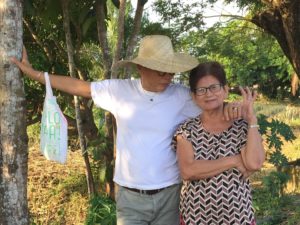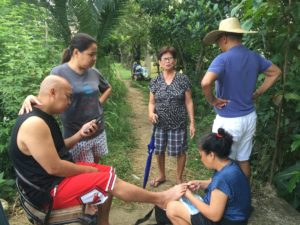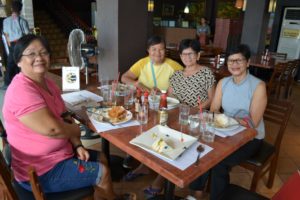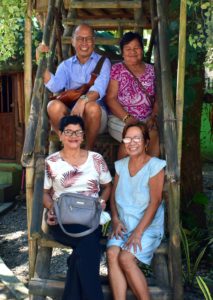Friends and Classmates Lost and Found
I’ve got a new friend. She is Sitang. No, not the Sitang famous for the cuchinta and other rice cakes she makes and sells in our town’s palengke (market) in Plaridel, Bulacan. The cuchinta Sitang was my childhood friend and classmate from Grade School. She is single. This new Sitang, a widow, is also from the same town, but I did not know her until Bebe – a classmate of mine and Cuchinta Sitang’s – introduced us to each other one summer day two years ago. We’ve been buddies since then – to my surprise.

Sitang and I

Sitang (with umbrella) lining up for a foot service at 7 AM at the Patubig dirt road in her village
It was my new hobby collecting rare bougainvillea varieties that brought us together. Bebe, her house a few meters away from mine, told me she knew someone who has a bougainvillea garden and asked if I’d like to see it, so I said, Ok, take me there. The Garden is in the next village, but she did not know exactly where. Bebe has a friend who does. That was Sitang; she can show us the place. “No need to call her, we can go straight to her house and pick her up,” Bebe was confident. And if she was not home, what then? I asked. She would be, Bebe insisted, she knew it. Indeed! Sitang immediately came out of the house when she recognized Bebe’s voice. “Get in the car and will tell you why we’re here,” Bebe again. Once Sitang was inside, a sudden disgusting smell that was unmistakably rotten fish took over. I had to open all car windows to get rid of the repulsive odor.
I was embarrassed that Sitang noticed I was offended by the repugnant smell she may have caused. She was cleaning squids and galungong (mackerel scad) and did not know we were coming. Otherwise, she would have changed clothes; she told Bebe in a voice that could wake the dead. The booming sound of her voice when she spoke jolted me, but I realized quite soon that it was naturally loud, a hawker’s – one for waking the dead really, but one gets used to it in the long run. She explained that she helps her daughter every day to prepare homemade foods for profits. Customers are mostly students attending the school located just across the house where the daughter lives. That students were getting squids and galungong that day I met her for the first time. That was long ago when galungong was known as the poor man’s viand because it was the most affordable fish one can get. Now they’re more expensive than our national fish – the milkfish – at 240 pesos a kg. And now everybody is proud to admit that they have galungong on the table. Suddenly, the lowly galungong has become a symbol of wealth. According to my cook, our cats won’t settle for anything less than galungong, and she was not exaggerating. I bought silinyasi (sardines-like fish or tawilis) one day for our four cats (not counting the several stray cats in our backyard my cousin would feed because she thinks she is Mother Theresa and my house, her convent). A kg of galungong won’t be enough. “I told you they don’t like them, “that was my cook. She was right. Oh, well, let them starve!
I did not find any new variety of bougies in the garden, but since it was already past lunchtime, I felt obligated to buy Bebe and Sitang lunch, for going out of their way to help. I suggested that we go have lunch at Max’s – the restaurant with that famous slogan they have been running since the time I can remember: “Max’s, the house that chicken built. “My treat, I said.
“Oh, I smell! “Sitang vehemently refused to join us. She wouldn’t be caught dining at Max’s, by far the most decent resto there is near where we live, in her smelly dress. I insisted that she come with us. By lunchtime, I was already used to her fishy smell. One gets immuned to the sights, sounds, and smell of everything around you after a while, so in my case, it didn’t matter to me if Sitang took a shower or changed clothes.
Call Lita, I said. She lives nearby, and it would be nice if she, too, could join us. Lita was my roommate in Manila way back in the ’70s when I was in college. We lost touch after I got my diploma and have not seen Lita for more than 40 years until one day when Bebe came to my place with a friend who happened to be Lita. Like Sitang, Lita was their classmate in grade school. Fate was kind that Lita and I would meet again!

Picking alagao leaves with Sitang in the early morning along the Patubig road
Sitang’s mobile rang while we were having lunch. It was a friend she was supposed to meet at the time of the call, but it skipped Sitang’s mind. She excused herself to leave, but I said to tell her friend she could come for coffee. The caller was another classmate of theirs – they don’t run out of classmates, it seemed to me at the time, classmates I might know, like this one. True enough, she happened to be my classmate in High School – a classmate I had not seen or heard from since 1962 when she quit school. She was Inga to us in HS, but Sitang and co. refer to her as Angie, so it didn’t occur to me that she was the same person on the line. “Angie, “Sitang said to Bebe and Lita, in a hushed voice that was almost a whisper.
“Meet Angie, our classmate in grade school, “Sitang said. “This is Badik, a friend of Bebe and Lita’s. “The name sounds familiar, she said. Yes, she remembered she had a classmate in HS with that name, but she could not reconcile the similarities. No, you can’t. That was like a century ago, my Dear! Usually, you would get a number to see me!
“Inga, Inga, been a long time! “I was ecstatic and hugged her.
“Angie, “she said, a finger on her pursed lips to hush me. I frowned. Yes, she is now Angie to everyone. What happened? Things happen when you are not looking.

Inga (in pink shirt) with Bebe, Sitang, and Lita at Max’s (The House that Chicken Built) Pulilan
“Angie, “she would remind me every time I’d say Inga to her. I was getting annoyed I could hardly hide it when I told her that Inga is a beautiful Scandinavian name. Beautiful in Scandinavia, maybe but not when you are in the Philippines, where names like Petra, Kulasa, Primitiva, and, of course, Inga, can offend Filipino ears. Primitiva? Search me, but why would a parent give a child that name? But, yes, what’s in a name? There’s so much in a name, Shakespeare, believe me, especially when you are a Filipino. Ask Inga!
You will always be Inga or Dominga to me like I will always be Badik to you and everyone else in my village. I am past that teen stage when I hated that nickname, so get over it. Her friends told me that she changed her nickname to Angie when she got a bit rich, lending money for profit. The name Inga didn’t have a pleasant ring to the ears, so Angie it had to be. She will always be Inga to me – that girl from my HS with the common perennial colds that made her sniffle constantly. We said goodbye to one another, me speaking, see you again sometime. It has yet to happen. Did you hear her say “in your dreams? ”

Meeting Linda (seated, R.) for the first time many years later after our HS graduation in 1969. Beside her is Lita. Bebe beside me
Linda was another classmate in HS. She was sweet sixteen the last time I saw her, on stage, in 1965, when our Class sang our Graduation Farewell Song. We never saw each other again until 2017 when both of us were in our late 60s. Bebe knew that Linda and I belonged to the Class of ’65 from the same HS. I’d wanted to see her since. She said she could arrange a meeting with her if I’d like to. That would be lovely, I agreed.
With my baseball cap, she didn’t recognize me immediately. Let me take off my hat then.
“Kalbo! “(bald!) she cried out, making the word sound like it was the most obscene word ever invented.
“Bitch!” my alter ego struggling hard to keep calm. I managed a weak smile.
“Di ka pa rin nagbago! Bata mo pang tingnan, “(You haven’t changed a bit: still looking young). I said, despite flashing a toothy smile.
“Bitch! Bitch! Bitch! “my alter ego again.
Running her fingers through her hair, she apologized for her looks. Had she only known we were coming. She then ran a hand over her duster dress. I remember her as the girl in HS who was very particular about her looks. Her school uniform was always crisply starched and pressed, her hair teased to look like a beehive.
We talked mostly about our classmates, about our much-hated School Director – a nun who was super mean and strict to us, her students, but one who, quoting a friend, had a Mary Magdalene complex. She could not decide if she would be a saint or a whore whenever Father Baltazar was near her.
Linda is not a whore – never was and never has been – but she has become an overnight saint, ironically after abandoning her catholic upbringing, against which she has a mouthful to say. Her faith is now much resilient, she claims. She is now “enlightened, “not hiding her contempt for those who remain in the dark.
Sitang does not hide her contempt for what to her is Linda’s ever-shifting religious state of mind, which can be “Catholic now, enlightened tomorrow.” “Kung saan ang ihip ng hangin, “(wherever the wind blows), was how she described it. A practicing Catholic, Sitang recites the rosary (imaginary?) even during her daily short morning brisk-walk along the Patubig (irrigation canal) in her village. She would stop walking – and praying – every time she bumps into someone she knows, for a chat or the latest gossip – the imaginary rosary beads dangling from her hand. (I have yet to see the rosary).
It was not rosary beads she had in her hands last time I saw her at the Patubig but a small ube root crop (purple winged yam), the size and shape of a ping-pong ball, her ying-yang ball, I assumed. She can give me more, she said, not to soothe my nerves, but to ask my gardener to cultivate in my garden. They should plant in the dark of the night. She saw me frowning, so she explained to me the theory that ube (purple) root crops, when planted during the day, would yield a crop that is pale or white, as opposed to deep purple. I smiled, realizing that Sitang, like me, was from another generation – a generation that still believes and follows to the letter, what our parents and grandparents taught us, no matter how weird they may have sounded to us then, now ridiculous to the Millenials.
We always find an excuse to get together — all of us now in our 70s, still finding time to laugh together, enjoying life while it lasts. I appreciate their company, and I hope they do mine. I may even one day learn to give in and call Inga a name she may like to please her. Any name, but Angie. As my truce offering, I’ll call her Dominga — her Christian name.
And Linda? Mary M.
https://waterfallmagazine.com
Great blog! Is your theme custom made or did you download it from somewhere?
A theme like yours with a few simple adjustements would really make my blog
stand out. Please let me know where you got your design. Thanks
a lot
Custom made. I was frustrated the first time I worked on it though but finally managed.:) Thanks for noticing.